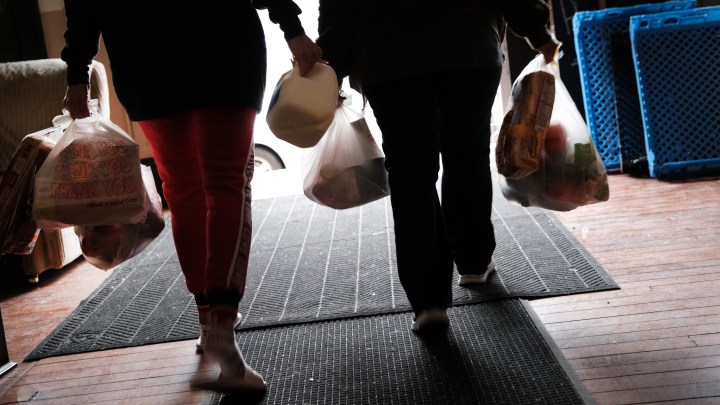
Food banks feel pinch of inflation

Pay attention to conversations happening in your supermarket and you’ll hear people expressing shock and dismay over how much a gallon of milk costs. Or a pork roast. Or a four-pack of frozen vegan burgers.
We recently learned that U.S. inflation reached a 31-year high in October. Grocery prices likewise rose the most in decades. Food costs are slamming household budgets, sure. But they’re also hitting nutrition-assistance programs, like food banks.
Those nonprofit organizations faced higher demand throughout the pandemic — and now their resources are being stretched even more.
A long line of people extends down Broadway Boulevard in Albuquerque and ends at the doors of the Storehouse New Mexico, where one of the food bank’s employees is checking people in.
Lots of longtime clients are here for this Friday distribution. Others, like Gwen Nelson, started coming to the Storehouse recently. “This is my second time,” she says.
Nelson lives on disability benefits that she says typically cover her monthly grocery bill. But since about mid-October, she’s had to seek extra help. “Everything has gone up. I had to apply for food stamps,” Nelson says. “I have to hit a couple food banks a month to get by.”
Michael Broward, who’s retired and is also on a fixed income, also says his benefits haven’t been stretching as far. “I notice everything is much more expensive.”
A volunteer hands him a box of free groceries, which he says takes some of the pressure off.
“So, let’s see what we got,” Broward says. “OK, so it looks like wheat flour, peanut butter. There’s raisins, there’s spaghetti.” Plenty of shelf-stable foods and a few pieces of fruit, but no fresh vegetables.
“Well, when it’s difficult for the food pantry to get any produce, they end up going without,” says Jill Beets, communications director with the Storehouse.
She says the rising cost of food is hitting the organization from all directions. “It’s more expensive and harder for us to get items. And because dollars aren’t going as far at the grocery store, we have more clients turning to the food pantry for food.”
And this all starts with supply chain disruptions.
When it comes to fruits and vegetables, farms are churning out plenty, according to Erkut Sönmez, who studies food supply chains at the University of Nebraska, Lincoln.
“Farmers had a very difficult time finding labor to harvest their fresh produce. This led to [an] incredible amount of fresh produce not being harvested,” Sönmez said.
Then, there’s limited capacity to process, package and transport the produce that does get harvested — and stiff competition to buy it wholesale.
“There’s a limited availability. You know, ‘We have apples, but not too many.’ Who’s gonna get it?” he said.
The largest chain grocery stores have the most purchasing power. “Then, there are smaller grocery chains or the neighborhood grocers. Then, it becomes the food banks.”
They’re stuck at the back of the line when it comes to wholesale purchasing. That applies to all food, not just fruits and vegetables.
Plus, fewer donations are coming in, Sönmez added. Since restaurants and grocery stores can’t stock up as much as they’d like, they’re managing their inventory more efficiently and have less to give away.
“Now it’s gonna be, really, a rationing game,” he said.
It hasn’t come to a rationing game yet at Storehouse New Mexico. There are enough donated beans, grains and canned vegetables to pack into boxes for today’s clients.
“You know, it’s been steady enough that we’ve been able to feed the households that come in,” Beets says.
But the food bank isn’t as well stocked for the future as she’d like. “Our shelves are normally completely full,” she says. “They’re not so full right now. You can see a lot of the wall behind things.”
The Storehouse has been bracing for the holidays, Beets adds, when demand for help tends to spike.
There’s a lot happening in the world. Through it all, Marketplace is here for you.
You rely on Marketplace to break down the world’s events and tell you how it affects you in a fact-based, approachable way. We rely on your financial support to keep making that possible.
Your donation today powers the independent journalism that you rely on. For just $5/month, you can help sustain Marketplace so we can keep reporting on the things that matter to you.

















